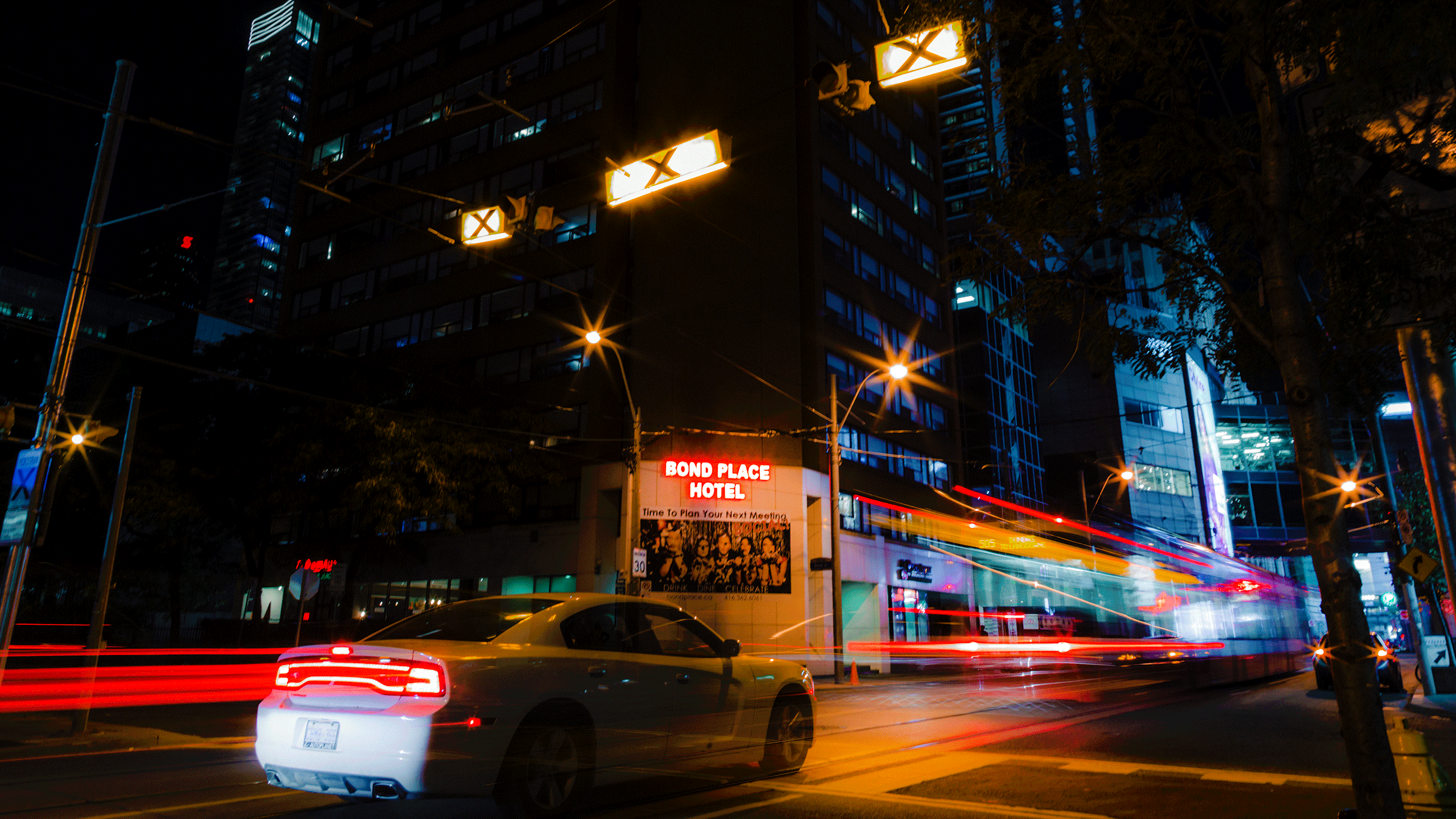By Pooja Rambaran
The Bond Place Hotel is one of 30 interim shelter programs for people experiencing homelessness opened to support physical distancing as part of Toronto’s COVID-19 response.
Officially opened as a shelter on Aug. 21, the city is leasing the site on 65 Dundas St. E. until fall 2020 and is likely to extend to spring 2021.
“When seeking sites to support the emergency need for physical distancing in the shelter system, staff sought buildings that are available, affordable, a suitable size, accessible and close to transit and services,” according to a statement from the City of Toronto’s communications advisor obtained by The Eyeopener.
Despite a total capacity of 285 rooms, the Bond Place Hotel shelter is only leasing 200 rooms to singles and couples of all genders.
The shelter staff is ensuring the safety of its residents by following Shelter Support and Housing Administration’s (SSHA) screening protocols, and implementing Toronto Public Health signage and educational materials on social distancing, occupancy limits in rooms and a mask requirement in common spaces.
“The city has implemented a standard screening process using the Public Health Ontario guidelines at all points of entry by phone or in-person for those seeking shelter,” the statement read, adding that all current clients are also actively monitored and screened.
“Individuals experiencing homelessness who test positive for COVID-19 will be referred directly to a recovery program located at an alternative location and stay there until they recover. Transportation to the recovery site will be provided by the City of Toronto.”
The shelter is operated by Dixon Hall Neighbourhood Services and provides mental health and addictions case management, meals, help with finding housing and community engagement opportunities.
“We currently have 133 individuals staying at the Bond Place Hotel, and are planning to welcome another 60 clients in November who were previously a part of the Out of the Cold program,” according to a statement from Dixon Hall’s communications manager obtained by The Eye.
The Out of the Cold program—a volunteer-driven program that serves people experiencing homelessness especially during the colder seasons—was forced to close due to challenges presented by the virus.
There have been approximately 70 COVID-19 cases reported in Toronto shelters due to communal living conditions.
“People can’t physically distance, stay home or wash their hands frequently if they’re in a shelter or living on the street”
The number of homeless encampments have grown across the city as those experiencing homelessness may face greater health risks due to overwhelmed shelters, pre-existing health conditions and exposure to others when moving between locations.
“People can’t physically distance, stay home or wash their hands frequently if they’re in a shelter or living on the street,” wrote Cathy Crowe, a street nurse and distinguished visiting practitioner at Ryerson in an essay for Toronto Life. “In the long term…COVID-19 is a wake-up call to the city to do right by its homeless population.”
The encampment community is a community that city staff is working to better understand, according to the Dixon Hall statement.
“Some people may choose to stay outdoors, in communities with which they are familiar. Several housing/shelter/hotel sites have opened at locations outside of the downtown core. People may choose to come back downtown to be closer to services and connections and their communities.”
As we begin the colder months, providing safe indoor spaces through programs like the Bond Place Hotel shelter is critical to ensuring the safety of vulnerable people experiencing homlessessness, according to the statement from the city’s communications advisor.
The statement added that all shelters in Toronto work from a Housing First model, which prioritizes assisting clients with securing permanent housing, with follow up supports then provided to help with their transition from the shelter.
At a webinar hosted by Continuing Education Students’ Association of Ryerson (CESAR) on Oct. 1 addressing ‘Structural Inequality: Housing.’ Crowe said the Housing First Model, which is based on U.S. policy, does little to solve Toronto’s housing problems.
“We’re seeing a lot of money thrown at homelessness right now but it’s not about really fueling and funding a big national bill of affordable housing, co-op housing, student housing, family housing, Indigenous housing [and] supportive housing,” Crowe said.
She added that the city can do more to provide additional social assistance to individuals in need, either through Ontario Works (OW) or the Ontario Disability Support Program (ODSP), among other platforms.
“That [has] to happen so that people can have a more livable income and not be paying 80 to 90 per cent of their income on rent,” Crowe said. “The city has to be pushed.”
CORRECTION: A previous version of this articled stated the incorrect names of Ontario Works and the Ontario Disability Support Program. The Eyeopener regrets this error.













Cathy Crowe
Can you make a correction. I’ve never heard of the Ontario Electrical Support Program! What I said was Ontario Disability Support Program. In addition the acronym for Ontario Works is OW not OE. Thanks so much! Cathy Crowe
Theresa Ann Hafenbrack
Please forward this message to Cathy Crowe
My name is Theresa Hafenbrack. I live in New Brunswick. I am trying so hard to locate someone I believe you may have been in contact with. His name is Jason ChieChie. Also called Cheech. If so could you please contact me at thafenbrack1972@gmail.com.
Thank you for your time.